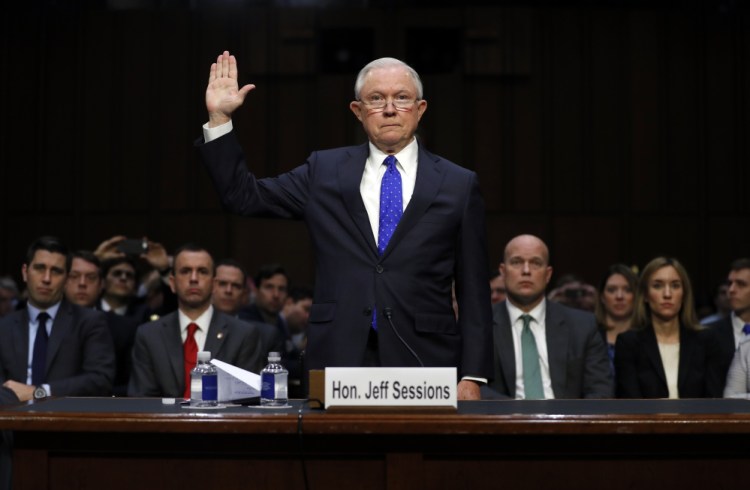WASHINGTON – Attorney General Jeff Sessions on Wednesday strongly defended President Donald Trump’s firing of James Comey, linking the FBI director’s abrupt dismissal to his handling of the Hillary Clinton email server investigation. But he refused to discuss any private conversations he had with the president leading up to Comey’s firing and would not say if he had discussed with the president an FBI investigation into potential coordination between Russia and the Trump campaign.
Sessions, appearing before the Senate Judiciary Committee, said it was “the first time I’m aware of” in which an FBI director had performed the traditional role of Justice Department prosecutors by announcing on his own the conclusion of a federal investigation – that no charges would be brought against Clinton.
He said he was further galled when Comey, one week before his firing, insisted to Congress that he would have taken the same actions again.
Sessions’ insistence that Comey’s firing was motivated by displeasure over the Clinton email case is consistent with the initial White House explanation. But Trump himself has at times appeared to undercut that explanation, saying he would have fired Comey even without the recommendation of the Justice Department and that he was thinking of “this Russia thing” when he dismissed him on May 9.
Trump has accused Comey of having prematurely exonerated Clinton, even though the Justice Department’s own explanation for the firing cited his decision to effectively reopen the probe days before the November election.
The FBI’s investigation is now being run by the Justice Department’s special counsel, Robert Mueller. After initially balking at the question, Sessions said that he had not been questioned by Mueller’s team of investigators. He has been seen as a possible witness in the case given his involvement in the firing of Comey.
Sessions stressed at the outset that he would not discuss any private conversations with the president and he largely abided by that principle, deflecting questions not only about the Russia investigation but also about the president’s pardon of Sheriff Joe Arpaio, among other topics.
The Russia probe has shadowed much of Sessions’ tenure as attorney general, even though he recused himself in March because of his role as a stanch Trump campaign ally. It was a central focus the oversight hearing, too, as lawmakers repeatedly pressed Sessions about his contacts with the former Russian ambassador to the U.S., his discussions with Trump about the investigation and his involvement in the firing of Comey.
Though he refused to say whether he discussed with Trump Comey’s involvement in the Russia investigation, or his private conversations with Trump, Sessions did say that the president had asked him and Deputy Attorney General Rod Rosenstein for their recommendations about what to do with Comey.
“He did ask for our written opinion and we submitted that to him,” Sessions said under questioning from Sen. Dianne Feinstein of California, the committee’s top Democrat. “It did not represent any change in either one of ours opinions.”
The routine oversight hearing is Sessions’ first before the committee since his January confirmation, and it comes as has worked quickly to reshape the department with an intense focus on immigration, drugs, gangs and violent crime.
He also faced questions from lawmakers about his swift undoing of Obama-era protections for gay and transgender people and his rollback of criminal justice policies that aimed to reduce the federal prison population, among other changes he has made in nine months since taking office.
Sessions has tried to pressure so-called sanctuary cities into cooperating with federal immigration authorities by threatening to withhold grant money, and he was the public face of the Trump administration’s decision to end a program benefiting hundreds of thousands of young people who entered the U.S. illegally as children. Congress is seeking a legislative solution to extend the protections before recipients’ work permits expire.
It is standard policy for attorneys general to appear each year before the Justice Department’s congressional overseers on the House and Senate judiciary committees. Yet, in a reflection of the extent to which the Russia investigation and his own role as a Trump campaign ally have dominated public attention, Sessions made his first appearance on Capitol Hill as attorney general before the Senate Intelligence Committee.
Democratic senators have already made clear they want Sessions to detail his private conversations with Trump, particularly in the run-up to the Comey’s firing, or announce that Trump is invoking executive privilege to protect those communications. Sessions repeatedly refused to discuss his talks with Trump during his three-hour appearance before the Senate intelligence panel.
He did not say he was using executive privilege, but rather adhering to longstanding tradition of Justice Department leaders to refrain from revealing the contents of private conversations with the president. That explanation left many Democrats unsatisfied and is unlikely to put to an end demands for detailed accounts of those conversations.
Copy the Story LinkSend questions/comments to the editors.



Success. Please wait for the page to reload. If the page does not reload within 5 seconds, please refresh the page.
Enter your email and password to access comments.
Hi, to comment on stories you must . This profile is in addition to your subscription and website login.
Already have a commenting profile? .
Invalid username/password.
Please check your email to confirm and complete your registration.
Only subscribers are eligible to post comments. Please subscribe or login first for digital access. Here’s why.
Use the form below to reset your password. When you've submitted your account email, we will send an email with a reset code.